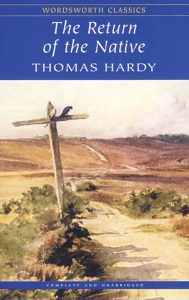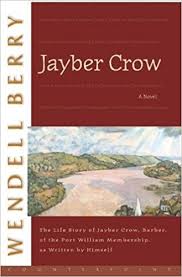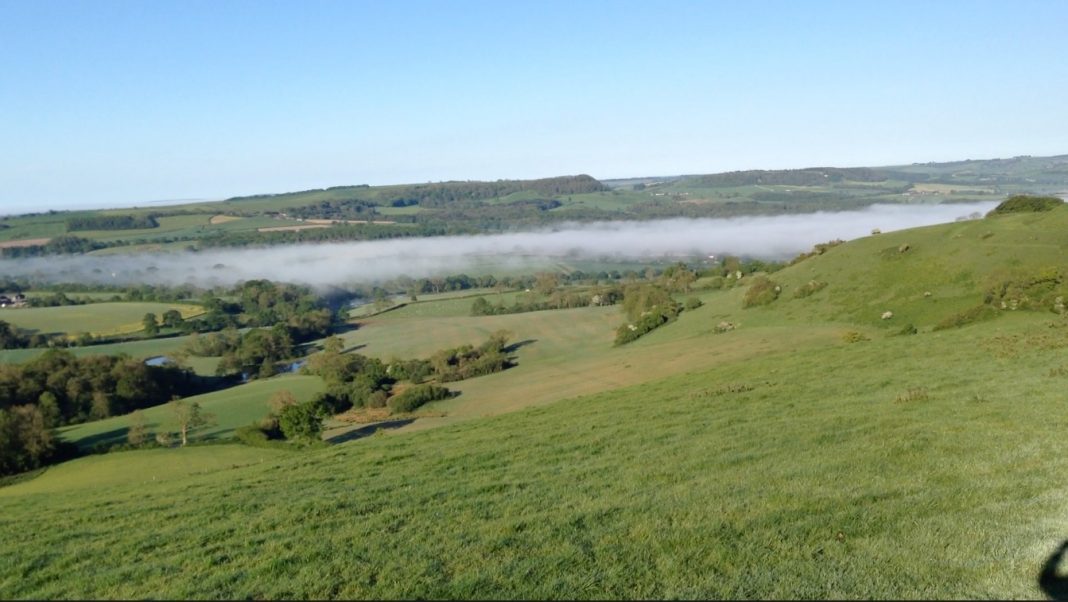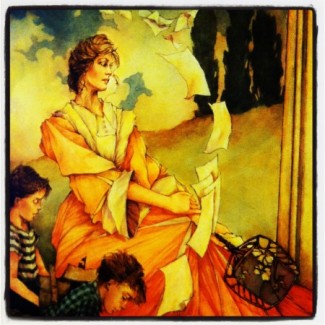The first time you read the novels of Thomas Hardy–especially if you read them as a young adult–you’re likely to get a pretty forceful impression. With the story-telling powers of a great tragedian, Hardy depicts an indifferent Universe crushing characters under the weight of chance events. People’s paths cross at precisely the wrong time. A game of dice interrupts an important errand. A letter slid under a door ends up stuck beneath the carpet. It can seem at times that Hardy lays all this fate business on a bit thick, going out of his way to inflict misery on his characters. Rhetorically as well, Hardy keeps his sledgehammer handy. Early in Jude the Obscure, the protagonist suffers a painful disillusionment, and could use a comforting word from a passerby. “But nobody did come, because nobody does,” the narrator glumly remarks.
Whether Hardy acquired his bleak fatalism and his enthusiasm for science from Darwin, or whether, as his friend Edmund Gosse claimed, the novelist’s views simply derive from “temperament and observation,” he fits a familiar late-nineteenth-century mold. When first encountered in a Brit Lit survey, he comes as a fictional counterpart to Darwin popularizers like Thomas Huxley and Herbert Spencer.
Reread Hardy after twenty years or so, however, and you might notice something different in the novels: a quiet stream of rural life running alongside the somber tragedy. Hardy’s “rustics” and “peasants,” as the first reviewers called them, pursue ancient livelihoods and amusements, content with ways they’ve inherited from their parents and grandparents. Speaking the Dorset dialect that Hardy himself used as a boy, they exchange comments such as one anonymous laborer’s declaration, in The Woodlanders, that “without charity we be but tinkling simples.” You can read these pastoral interludes as incidental background, or as comic relief throwing grand events into an even grander perspective, but it’s hard not to suspect there’s more going on. Especially for Wendell Berry readers, Hardy’s preoccupation with traditional work and pastimes shows an abiding sense of place.
Berry is on record as a Hardy admirer, and in Jayber Crow we find the barber sitting up late reading The Woodlanders. In Hardy’s fictional Wessex, scene after scene anticipates similar interludes in Berry’s Port William, as the heath-dwellers and woodlanders kill time (or loaf, as Berry would say) and pursue their outdoor tasks. They know the plants and creatures that surround them, and they follow barely traceable paths where a visitor would get lost. News travels quickly. Neighbors visit at all hours. Hardy even devotes a humorous passage in The Return of the Native to the “local barbering”—a standby of Port William social life, of course—that assembles neighbors on Sunday mornings.
This other, localist Hardy has always had his fans. Generations of tourists have sought out landmarks like Casterbridge, Egdon Heath, and the luxuriant valley where Tess Durbeyfield and Angel Clare find love among the cows. Under the Greenwood Tree, one of Hardy’s earliest novels, consists of practically nothing but local customs and lore. But with The Return of the Native Hardy elevates a local setting to central thematic importance—asking, as would Berry a century later, what it means to know and belong to a particular place.
 Egdon Heath, where The Return of the Native unfolds, is one of Hardy’s most fully realized locales, beginning with the famous opening chapter, “A Face on Which Time Makes but Little Impression.” Once the story gets underway, Hardy pauses frequently to dwell on heath particulars, describing flora and fauna, evoking the prehistoric builders of forts and barrows, and devoting numerous scenes to the activities of the present inhabitants. Characters frequently embark on night-time walks that only residents of the heath would undertake, and they stage their seasonal celebrations on its clearings and heights. Clym Yeobright, the “native” of Hardy’s title, is one of these rugged cottagers, “inwoven with the heath in his boyhood,” “permeated with its scenes, with its substance, and with its odors.” He loves the place with the immediate attachment of experience and memory.
Egdon Heath, where The Return of the Native unfolds, is one of Hardy’s most fully realized locales, beginning with the famous opening chapter, “A Face on Which Time Makes but Little Impression.” Once the story gets underway, Hardy pauses frequently to dwell on heath particulars, describing flora and fauna, evoking the prehistoric builders of forts and barrows, and devoting numerous scenes to the activities of the present inhabitants. Characters frequently embark on night-time walks that only residents of the heath would undertake, and they stage their seasonal celebrations on its clearings and heights. Clym Yeobright, the “native” of Hardy’s title, is one of these rugged cottagers, “inwoven with the heath in his boyhood,” “permeated with its scenes, with its substance, and with its odors.” He loves the place with the immediate attachment of experience and memory.
Unlike his “rustic” neighbors, however, Clym has also spent time away from Egdon Heath, working in the Paris diamond trade. Returning as a well-established young man to visit his mother, Clym prolongs his stay and begins a new relation to the heath. He no longer shares the furze-cutters’ and turf-cutters’ spontaneous oneness with the place. His years away have changed his outlook.
In a May 7 FPR review of J. Drew Lanham’s The Home Place: Memoirs of a Colored Man’s Love Affair with Nature, Jeff Bilbro writes, “To see a given reality clearly, in all its complexity, we have to belong and yet be able to step back; we have to be intimately involved with the details and yet able to see the big picture.” Like Lanham–like Thomas Hardy himself–Clym has stepped back from the reality of his native place, adding to its “substance” and “odors” the clearer vision that perspective can bring. He’s exchanged his unreflective embrace of the heath for a broader, deeper knowledge.
The question then arises—urgently in Hardy, more subtly in Berry: to what extent is such knowledge a good thing?
Introducing a collection of essays on The Return of the Native, Harold Bloom reports, upon rereading the novel, that he “had almost forgotten Clym,” whom he finds “a weak failure in characterization.” You don’t need to go quite that far to share Bloom’s reservations. Where Clym’s neighbors speak and act with a simple directness, the young man from Paris seems tentative and divided. He wants to become a teacher, which for him means improving the locals with book learning and a hazy religiosity. He disapproves of their superstitions, yet lacks any real empathy with the needs behind them. Conversing with his neighbors, this young man who’d once lived in harmony with the heath seems awkward and self-conscious. His strictures and fault-finding, springing from a wider knowledge of the world, verge on a weak (as Bloom would say) fastidiousness and sanctimony.
In his fiction, Berry too seems wary of the mixed blessings such complicated knowledge bestows. The 1967 version of A Place on Earth contains a sequence in which Mat Feltner’s father sends him to Europe for a year. At the end of his travels Mat decides he wants to return to Port William and begin farming. Later he sees that “[t]here was probably little chance that he might have chosen differently,” but he’s grateful just the same for having been given the choice. This episode of leaving and returning, cut from the 1983 revision of the novel, might explain some of Mat Feltner’s more elusive qualities.
There’s a certain aloofness about Mat, a distance from his neighbors not entirely accounted for by the loss of his son Virgil. Like Clym, Mat dislikes the official local religion, as when he memorably resents Brother Preston’s clumsy pastoral call. Also like Clym, he’s uncomfortable with the local folklore, barely tolerating Aunt Fanny, the old black woman who scares the Catlett boys with stories about the Devil and “Fee Fo.” In the 1967 edition, Mat struggles at some length to determine what bothers him about Aunt Fanny. And then there are those drunken shenanigans involving lowlifes like Burley Coulter, Big Ellis, Whacker Spradlin, and Jayber Crow. True, Mat’s a married man, and true, he’s mourning his brother-in-law Ernest when Whacker’s midnight “funeral procession” passes by—but it’s difficult to imagine Mat joining these pranks under any circumstances. He’s too solemn, too removed from the lawless impulses of the town.
Is Mat the way he is because he went to college and lived abroad? Or was he just always the reflective sort, who naturally went in for education and travel? In any case he fits the mold of the native who’s spent time away, who no longer fits in readily with the home folks. If Mat has come to know Port William more fully, his knowledge assumes an austere form that distances him from his neighbors.
Where Berry explores this tendency in a leisurely, episodic fashion, Hardy dramatizes it in stark, almost schematic terms. Clym Yeobright, returning with modified standards of beauty, comfort, and wealth, is susceptible to the charms of Eustacia Vye, the striking woman who has come to Egdon to live with her grandfather. Falling for Eustacia, Clym falls out of joint with the heath and falls in with people who spurn its rough attractions.
Hardy devotes a whole chapter, “Queen of Night,” to introducing Eustacia, his tragic heroine. Stripped of the classical and historical allusions Hardy lavishes upon her, Eustacia boils down to two controlling desires. She wants the excitements she believes she’s owed, and she wants to get away from Egdon Heath. As she tells her lover Damon Wildeve, the ne’er-do-well husband of Clym’s cousin Thomasin, she wants “what is called life—music, poetry, passion, war, and all the beating and pulsing that is going on in the great arteries of the world.”
Eustacia sets her sights on Clym because he represents the diversion she craves. Insisting that she loves him for himself, and will live with him anywhere, she sees him as her ticket to a glamorous Parisian life. Consciously or not, she holds him to a promise he never gives. The impossible love of Clym and Eustacia begins sputtering as soon as it ignites. By the end of the novel it has severed Clym’s relationship with his mother and culminated in three deaths.
The citified, literary Hardy needs Eustacia and Wildeve so he can set forth his grand tragedy. Eustacia the dissatisfied town-dweller and Wildeve the restless, failed engineer provide the makings of a spectacular romance. They look good against the storm-tossed heath. They advance Hardy’s program of blundering chance and a heartless universe. But Hardy the Dorset localist can’t resist exposing the pair as misfits, almost farcically out of place on the heath.
“Such a rare plant in such a wild place it grieves me to see,” laments Wildeve—reading Eustacia more accurately than her husband Clym ever does. For Eustacia, Egdon is a place where a stroller risks meeting “demons in the air, and malice in every bush and bough,” while a native like Thomasin looks at the heath and sees “a nice wild place to walk in.” “What, do you like Egdon Heath?” her husband Wildeve exclaims. Clym’s mistake, triggered at least in part by his Paris years, is to throw his lot in with people like Eustacia and Wildeve who despise the heath.
Nine years after publishing The Return of the Native, Hardy told a virtually identical story—swapping genders and evoking a different setting, but winding up at the same rueful localism. The Woodlanders, as its title indicates, features a forested corner of Hardy’s Wessex, and the native who returns there is female. Grace Melbury, daughter of a status-seeking timber merchant, comes home to her tiny village after a period of genteel schooling, to be promptly wooed by a newly arrived physician named Edred Fitzpiers. The doctor is convinced he’s “made for higher things,” and seems to Grace, exactly as Eustacia seems to Wildeve, “like a tropical plant in a hedgerow.”
Instead of being warned by the intuition, Grace smothers her misgivings and marries Fitzpiers. Where Eustacia Vye, constrained by a woman’s meager options, dreams of insubstantial glories, Fitzpiers’s “higher things” involve esoteric knowledge of all kinds: scientific, philosophical, literary. At one point Grace thinks of Fitzpiers as “a remorseless Jehovah of the sciences.” But the physician-scientist turns out to be just another of Hardy’s rakes, like Damon Wildeve or Alec d’Urberville. Soon he’s panting after Felice Charmond, a fellow exotic flower, leaving Grace to reflect that “cultivation” —her tutelage at the fancy school—“has only brought [her] inconveniences and troubles.” Knowledge might afford a wider perspective on a place, but it also brings new dangers and disrupts old ties.
Compared with Clym Yeobright and Grace Melbury, Mat Feltner escapes any disastrous conflict with his origins. He marries down-to-earth Margaret and tends a thriving farm in the place he loves. Yet he’s marked in subtle ways by the time he spends away from Port William—perhaps leading Berry to cut the Europe sequence, along with some of Mat’s judgmentalism, when he revised A Place on Earth. Not until Jayber Crow (2000) does he create a returning native who achieves a real closeness to his home place and his neighbors.
 Jayber’s early life is briefly told in A Place on Earth. In Jayber Crow Berry elaborates on Jayber’s lonely upbringing, his years as a would-be minister, his swerve into skepticism, and his Lexington sojourn where he attends the university, masters the barber trade, and samples worldly pleasures. Together with the beginning of Jayber’s old age—long after the interval chronicled in A Place on Earth—these experiences form a complete narrative arc. Back in Port William, Jayber finds an occupation among affectionate neighbors and eventually exchanges a casual liaison for his peculiar “marriage” to Mattie Chatham. He makes his peace with Christianity, wary of institutions but willing to call himself a “man of faith.” He winds up living in a little “camp”-style house by the river, much like the house that Berry re-built and lived in while writing A Place on Earth.
Jayber’s early life is briefly told in A Place on Earth. In Jayber Crow Berry elaborates on Jayber’s lonely upbringing, his years as a would-be minister, his swerve into skepticism, and his Lexington sojourn where he attends the university, masters the barber trade, and samples worldly pleasures. Together with the beginning of Jayber’s old age—long after the interval chronicled in A Place on Earth—these experiences form a complete narrative arc. Back in Port William, Jayber finds an occupation among affectionate neighbors and eventually exchanges a casual liaison for his peculiar “marriage” to Mattie Chatham. He makes his peace with Christianity, wary of institutions but willing to call himself a “man of faith.” He winds up living in a little “camp”-style house by the river, much like the house that Berry re-built and lived in while writing A Place on Earth.
All these events show Jayber making himself at home in Port William, but they aren’t the chief means Berry uses to reveal his protagonist’s condition. Jayber tells his own story, and this effortless current of natural speech, one of the strongest first-person voices in American fiction, gives eloquent expression to Jayber’s discoveries and musings. In the radiant closing chapters, Jayber rehearses the particulars of his daily life, counts up his gains and losses, and declares himself “the ultimate Protestant,” for whom “Christ did not come to found an organized religion but came instead to found an unorganized one.” This is the voice of one who has ventured into the great world and returned, not with the scientific hubris of a Dr. Fitzpiers, nor the patronizing benevolence of a Clym Yeobright, but with a renewed responsiveness to the beliefs and customs of his home. Skepticism yields to devout humility. Obligation to others takes the place of lonely freedom. Enlightened by his books and experience, Jayber can indeed see the home place clearly; but surpassing everything else, enriching his knowledge and steadying his voice, is a calm, unmistakable wisdom. He knows his place, he knows something of the wider world, and he understands how much he owes to each.












Great essay. I’ve been reading Hardy since my college days almost 40 years ago, but came to Berry only in the late 90’s. It’s very apparent to me that the rural element I enjoy in Berry’s fiction I first encountered in Hardy. My first exposure to Hardy was via Polanski’s 1979 film Tess, which I saw in 1980. I liked the movie so much I immediately bought and read the book, and have been reading him ever since.
There’s an essay by the Agrarian/Fugitive poet Donald Davidson in which he makes a convincing case that many of Hardy’s plot elements grew out of his familiarity with the rural ballad tradition. His “coincidences” for instance, which are sometimes criticized for being too artificial, are undoubtedly the stuff of rural balladry, rather than facile contrivances invented by the author for plot convenience.
“You can read these pastoral interludes as incidental background, or as comic relief throwing grand events into an even grander perspective, but it’s hard not to suspect there’s more going on.”
Hardy’s depiction of rural folk is sometimes comical, but never demeaning or sarcastic. When he pokes fun he does it gently. This in and of itself speaks strongly to his respect for “place” and its people.
Full disclosure: I’ve never read Hardy or Berry!
When looking around online for the Davidson piece I mentioned above I came across this:
http://www.review19.org/view_doc.php?index=315
A pricey book, but it looks like it might be worth the outlay!
Lovely article, Mr. Heddendorf. Thank you. I happily returned home to my rural hometown after attending college, having been deeply impacted by localist ideas and sensibilities. Do you believe Far From the Madding Crowd equally depicts the themes you described above?
Comments are closed.